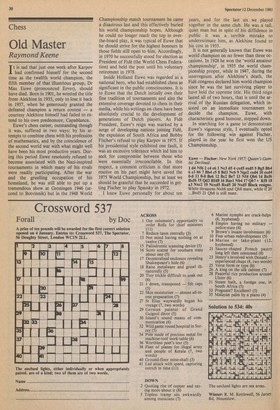Old Master
Raymond Keene
It is sad that just one week after Karpov had confirmed himself for the second time as the twelfth world champion, the fifth member of that illustrious group, Dr Max Euwe (pronounced Erver), should have died. Born in 1901, he wrested the title from Alekhine in 1935, only to lose it back in 1937, when he generously granted the defeated champion a return contest — a courtesy Alekhine himself had failed to extend to his own predecessor, Capablanca.
Euwe's chess career, outstanding though it was, suffered in two ways: by his attempts to combine chess with his profession of mathematics, and by the coincidence of the second world war with what might well have been his most productive years. During this period Euwe resolutely refused to become associated with the Nazi-inspired tournaments in which many of his rivals were readily participating. After the war and the gruelling occupation of his homeland, he was still able to put up a tremendous show at Groningen 1946 (second to Botvinnik) but in the 1948 World Championship match tournament he came a disastrous last and this effectively buried his world championship hopes. Although he could no longer reach the top in overthe-board play, it was typical of Euwe that he should strive for the highest honours in those fields still open to him. Accordingly, in 1970 he successfully stood for election as President of Fide (the World Chess Federation) and held the post until his voluntary retirement in 1978.
Inside Holland Euwe was regarded as a national hero, who had established chess as significant in the public consciousness. It is to Euwe that the Dutch initially owe their fine tradition of tournaments and also the extensive coverage devoted to chess in their media, while his writings on chess have been absolutely crucial to the development of generations of Dutch players. As Fide President, Euwe's reign was marked by a surge of developing nations joining Fide, the expulsion of South Africa and Bobby Fischer's refusal to play Karpov in 1975. If his presidential style exhibited one fault, it was an excessive tolerance which led him to seek for compromise between those who were essentially irreconcilable. In this respect, a common criticism is that more resolve on his part might have saved the 1975 World Championship, but at least we should be grateful that he succeeded in getting Fischer to play Spassky in 1972.
I knew Euwe personally for about ten years, and for the last six we played together in the same club. He was a tall, quiet man but in spite of his diffidence in public it was a terrible mistake to underestimate him, as Alekhine found to his cost in 1935.
It is not generally known that Euwe was world champion on no fewer than three occasions. In 1928 he won the 'world amateur championship', in 1935 the world championship proper, while in 1947, during the interregnum after Alekhine's death, the Fide congress declared him world champion since he was the last surviving player to have held the supreme title. His third reign lasted all of two hours, that is until the arrival of the Russian delegation, which insisted on an immediate tournament to decide the champion. Euwe, with characteristic good humour, stepped down.
In searching for a game to demonstrate Euwe's vigorous style, I eventually opted for the following win against Fischer, played in the year he first won the US Championship.
Euwe — Fischer: New York 1957; Queen's Gambit Declined.
1 d4 Nf6 2 c4 e6 3 Nc3 d5 4 cxd5 exd5 5 Bg5 Bb4 6 e3 h6 7 Bh4 c5 8 Bd3 Nc6 9 Nge2 cxd4 10 exd4 0-011 0-0 Be6 12 Bc2 Be7 13 Nf4 Qb6 14 Bxf6 Bxf6 15 Qd3 Rfd8 16 Rae! Nb4 17 Qh7 + Kf8 18 a3 Nxc2 19 Ncxd5 Rxd5 20 Nxd5 Black resigns. White threatens Nxb6 and Qh8 mate, while if 20 ...Bxd5 21 Qh8 is still mate.






































 Previous page
Previous page